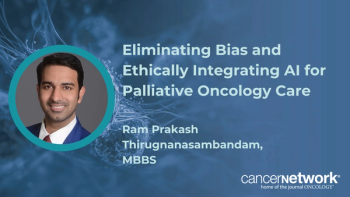
Undetected MRD Confers Improved PFS With Ibrutinib Combo in CLL/SLL
Bulkiness of disease did not appear to impact PFS outcomes with ibrutinib plus venetoclax in the phase 2 CAPTIVATE study.
In a conversation with CancerNetwork® at the
Ghia, a professor in medical oncology and director of the Strategic Research Program on CLL at Università Vita-Salute San Raffaele University in Milan, Italy, explained how this study aimed to explore how lymph node sizes impacted efficacy outcomes with the ibrutinib combination. Regardless of whether patients had lymph nodes that exceeded or fell under 5 cm, however, undetectable MRD correlated with improvements in long-term PFS.
Investigators of the CAPTIVATE study concluded that long-term PFS was mostly related to undetectable MRD status, as responses per International Working Group on CLL criteria demonstrated a minor impact on outcomes, which was reported only in those with detectable MRD. Additionally, the safety of fixed-duration ibrutinib plus venetoclax was comparable regardless of lymph node bulkiness at baseline.
Transcript:
This year at ASH, we are presenting an update of the study with 5.5 years of follow-up, but that was not the point. The point is that we wanted to explore if and how bulky lymphadenopathy, defined as more than 5 cm of lymph node size, is affecting the response or the PFS in our patients. And what we have shown is that there is no difference in terms of long-term PFS in patients with less or more than 5 cm of the lymph node. In particular, the PFS was not different if the lymph node response was reducing the lymph node size below 1 cm or only below 2 cm.
What mattered, and this [was proved in] many other studies, was reaching undetected MRD. Even if you started with more than 5 cm of lymph node, even if you ended up with more than 2 cm of lymph node, if you had undetected MRD status, then your PFS was better than if you did not achieve undetected MRD. The value of undetected MRD was higher than the clinical response itself.
Reference
Wierda WG, Jacobs R, Barr PM, et al. Consistently high 5.5-year progression-free survival (PFS) rates in patients with and without bulky baseline lymphadenopathy ≥5 cm are associated with high undetectable minimal residual disease (uMRD4) rates after first-line treatment with fixed-duration ibrutinib + venetoclax for chronic lymphocytic leukemia (CLL)/small lymphocytic lymphoma (SLL) in the phase 2 CAPTIVATE study. Presented at the 2024 American Society of Hematology Annual Meeting and Exposition. December 7-10, 2024; San Diego, California. Abstract 1869.
Newsletter
Stay up to date on recent advances in the multidisciplinary approach to cancer.












































